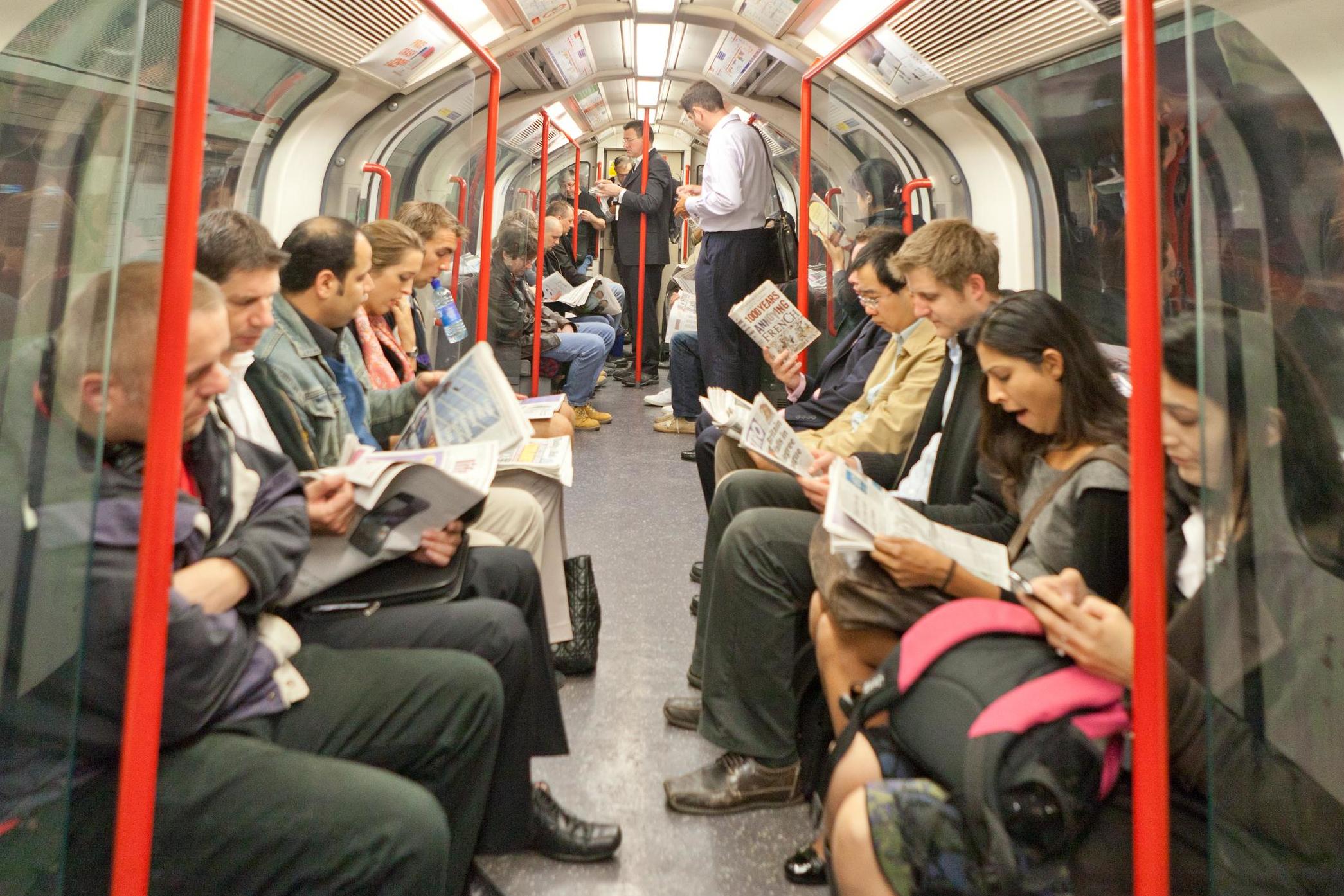I spoke to total strangers on the tube every day for a week – here's what happened
For Loneliness Awareness Week, Olivia Petter challenged herself to talk to fellow commuters – it was not easy


I’ve just asked the person next to me how their day is going and they’ve ignored me. Ten minutes later, I ask someone what their name is. They mumble something inaudible and plug their headphones in. I make eye contact with the person opposite me and open my mouth to speak, but before I do, they’ve already closed their eyes and are pretending to be asleep.
It’s Loneliness Awareness Week and I’m spending the next five days attempting to speak to strangers on the tube as part of an experiment to see how people react – and if this is the answer to our increasing social isolation. So far? It's not going so well.
Every day, roughly two million people travel on the London Underground. And yet, almost none of them talk to one another. I’m guilty of this myself. When I commute into work, it’s preposterously early, I’m sandwiched in between squashed, sometimes smelly, bodies and I’m usually half asleep. The last thing I want to do is ask a stranger how their morning is going, because mine is unpleasant enough. As for the return home, I’m either too busy sending emails, reading, or staring into space to think about conversing with someone.
It transpires that many of my fellow Londoners feel the same way. In 2016, an American man named Jonathan Dunne tried to bring some of his nation’s famously gregarious spirit across the pond by creating badges printed with the words “tube chat?”and handing them out to commuters to incite conversation. But very few took to the idea. Dunne was ridiculed on social media and later revealed that he struggled to convince people to even take one of the free pins, let alone speak to a stranger.
Clearly, us Brits were far too concerned with our stiff upper lips to indulge the keen American with his well-meaning idea. But maybe it’s time we changed that. We’re a nation in the midst of a loneliness epidemic. Research conducted by the British Red Cross estimates that more than nine million people in the UK – that’s almost one fifth of the population – say they are always or often lonely.
On Monday, the UK’s Minister for Loneliness, Mims Davies unveiled a new campaign to tackle the stigma of feeling alone. And on Sunday 23 June, an exhibition called London Is Lonely, organised by The Loneliness Lab as part of the Jo Cox-inspired "Great Get Together" campaign, will showcase photographs and audio stories documenting the extent of loneliness pervading the capital city.
“Many of our public spaces in London (the tube especially) aren’t designed for human connection to happen,” says Tessa Blencowe, artist and co-curator of the exhibit.
“We don’t even have to talk to the local shop assistant any more with automated checkouts. Because of this, we’ve created a social norm that means social interaction not only doesn’t happen, but isn’t ‘welcome’ in those spaces,” she tells The Independent.
In the hope that I could prove Blencowe and myself wrong – and see whether I’ve lost out on hundreds of meaningful conversations by commuting in silence – I was eager to commence my week as a chatty commuter. Here’s what happened.
Monday
Morning: Oh my god this tube is busy. My face is so close to this man’s armpit, I can smell what is left of his Sure deodorant (not much – he really should have re-applied). I consider telling him this, but chicken out.
Evening: It’s not until the tail end of my journey home from work that I pluck up the courage to speak to someone. And when I say tail end, I mean 30 seconds before the tube pulls into my stop. Speak and dash. Chat and split. That’s my plan. I try to identify a target and spot a woman opposite me with a cartilage piercing. I got the same piercing done a few days ago and it hurts like hell. I decide that this is my in.
“Does your piercing hurt?” I ask, pointing to mine to show her I have the same one. She doesn’t hear me. I repeat myself and point again. She looks up. “Oh, yeh it kills me,” she replies, smiling. “I can’t sleep on it, It’s so painful.” I ask her when she got it done. “Ten years ago”. It’s my stop. I leave feeling positive about the week because I spoke to someone. I’m less optimistic about the piercing.
Tuesday
Morning: Didn’t sleep well last night. I try to catch eyes with a woman who looks around my age, I fail. I give up and nod off.
Evening: I can’t stop looking at this woman’s dusky pink wrap dress. It looks like something Amal Clooney might wear to a client meeting and then to cocktails with George Clooney. “Excuse me, erm, where did you get that dress from?” She looks up at me, slightly started. A few seconds later (though it feels like hours) she replied: “LK Bennet.” “Oh, cool,” I say. “I’ve always really liked their clothes.” I proceed to scan my eyes around the carriages as I talk about how disappointed I was when the company filed for administration in March and how I always loved their shoes and how I think my aunt once met the owner. She says nothing. I look back at her and realise she has plugged her headphones in.
Wednesday
Morning: It’s very balmy in this carriage. I spot a woman who does not appear to have headphones on her. I sit next to her. “Very hot in here, isn’t it?” She looks shocked but replies, “yes”. “It’s always so hot on the train at this time of day, isn’t it?” “Yes”. “Do you get the tube often?” “Yes.” I think of a question that could prompt a more interesting answer and ask her where she works. She tells me she’s a volunteer at a nearby hospital and swiftly looks away. She gets off at the next stop.
Evening: There’s a man in a business suit next to me at Warren Street. He glances over at me a few times and I decide he might be a good person to chat to. But he keeps avoiding my gaze. Then the tube stops in the tunnel on its way to Oxford Circus. It’s very quiet. “I hate when the tube does this!” I say, a bit too loudly. Thankfully, he looks up. He smiles, nods once, and goes back to playing Solitaire on his phone. Other people are looking at me oddly.
Thursday
Morning: I decide to take a more direct approach and ask a thirtysomething man reading the newspaper what his name is. He looks at me like I’ve just asked what his favourite sex position is. “Perry,” he replies, looking away. I decide not to give up yet. “Do you think it’s weird that people don’t speak on tube?” I ask. “Nah not really, people like to keep to themselves don’t they?” He returns his newspaper. The awkwardness becomes too much to bear after two stops (I have five to go). I get off and wait for the next train.
Evening: In the name of directness, I ask a friendly-looking gentleman, who is flicking through a copy of GQ, how he is today. He turns around as if I’ve asked someone behind him. I persist, and ask again. He lets out a wheeze of nervousness, nods, and returns to GQ.
Friday
Morning: I have nothing to lose today. I choose to approach with one of life’s meatiest topics and ask the builder drinking Red Bull who he thinks is going to be the next prime minister. “Me? Dunno mate,” he shrugs.
Five minutes later, I’ve changed trains to get the Victoria line. I decide to ask another man the same question, but later into the conversation. I begin by asking him what he does for a living.

“Commercial manager, you in college?” I say yes without thinking because this is the first time anyone I’ve spoken to this week has asked me a question. “Who do you think will be prime minister?” I ask, hoping for a healthy political debate. “Boris.” I ask why. “People like him.” People like you? “Nah. I prefer Farage. In fact, bring back Maggie Thatcher.”
Final thoughts
I knew this was never going to be easy. But I am surprised that after five days of making an effort to speak to so many people, I didn’t manage to sustain a single conversation for longer than a minute and was asked just one question. I naively thought that once I’d made the first move with the right person, chatter would flow, even if it was just about how efficient the Victoria line is. I also didn’t anticipate how embarrassed I would feel approaching people. The tube is a public space, and yet, the way commuters reacted to me made me feel like I'd just caught them masturbating in a toilet. And that’s just the ones whose attention I was able to catch. The majority of people I came across this week were either listening to music, reading a book, or gazing deeply into their phone.
Tanya Goodin, digital detox expert and host of the podcast “It’s Complicated: untangling the relationship with our phones,” is not surprised I’ve struggled. “There’s increasing evidence that we’re vanishing into our phones, using them to hide behind; using them to escape awkward situations we find ourselves in and using them to avoid speaking,” she tells The Independent. It’s a bleak thought, but I know from experience that Goodin is right. Yes, the UK is in the grips of a loneliness crisis and we need to find a solution. I’m sure there is one, but talking to strangers on the tube probably isn’t it.
Join our commenting forum
Join thought-provoking conversations, follow other Independent readers and see their replies
Comments
Bookmark popover
Removed from bookmarks